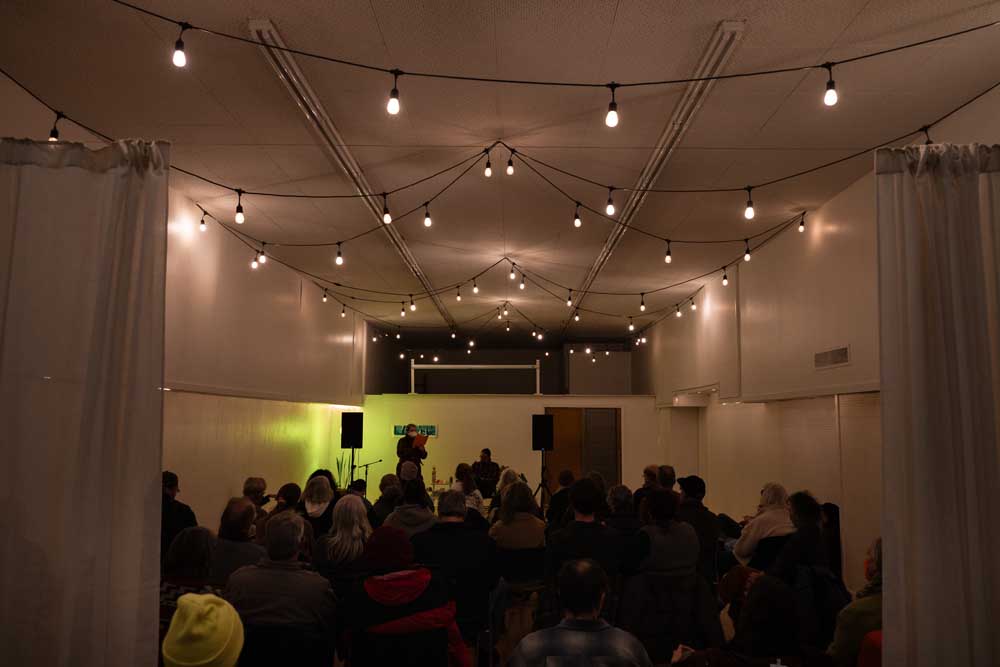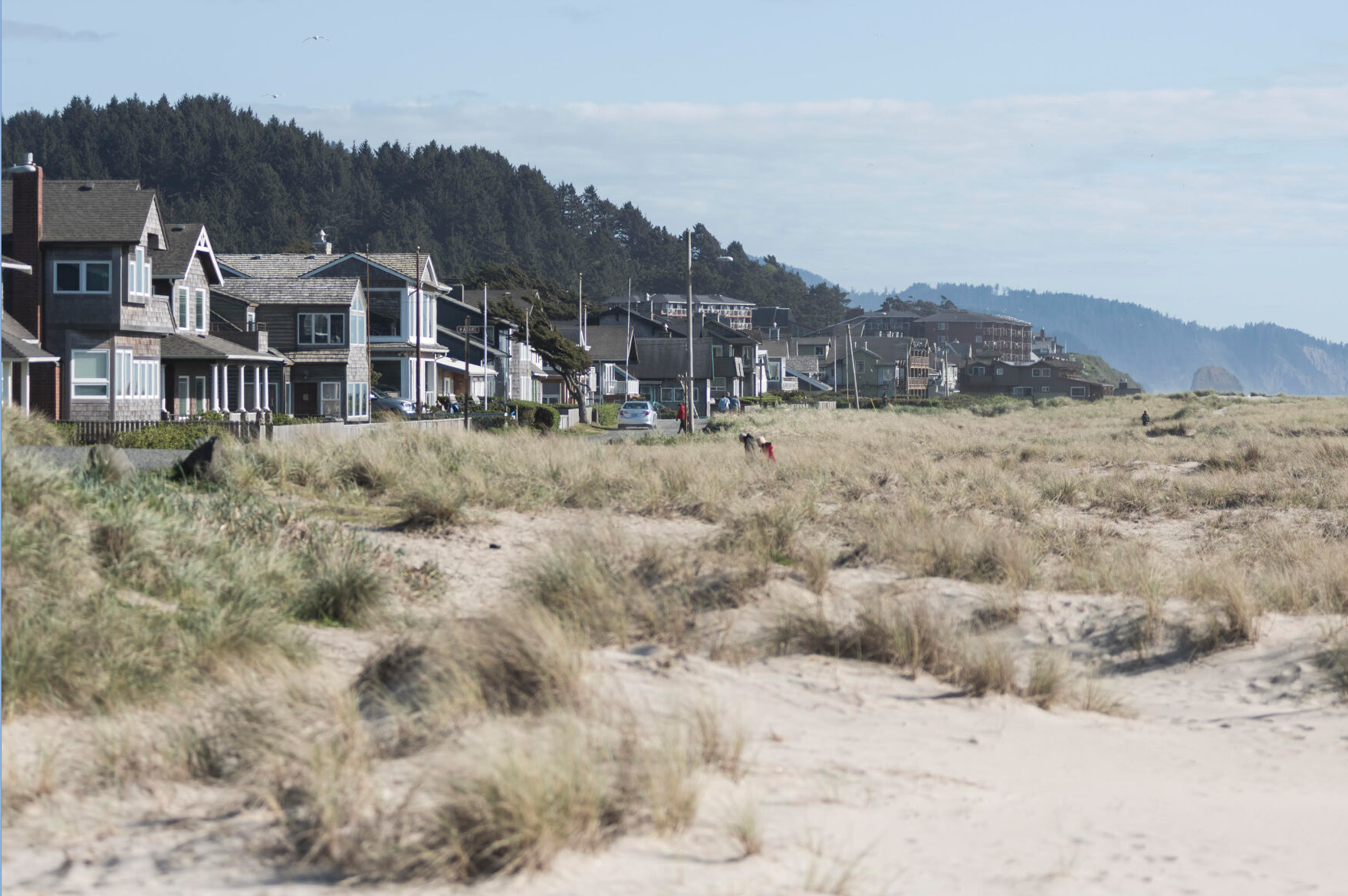Weekend Break: FisherPoet collects pandemic thoughts
Published 1:00 pm Friday, January 3, 2025

- Moe Bowstern reads from a new collection of zines focused on life during the COVID-19 pandemic at "Authors of Earth," Dec. 4 at the Anita Building in Astoria.
When the COVID-19 pandemic erupted in March 2020, Moe Bowstern took to Instagram, using her literary skills to write short, introspective missives about daily life.
Trending
For about 17 months, the regular at Astoria’s annual FisherPoets Gathering posted on a daily basis, addressing her growing readership as “People of Earth.”
“This is our home,” she said. “The Earth gives us everything we need, and we need to take care of each other and the Earth.”
Eventually, Bowstern decided to move her poetic writings offline into a physical zine. In all, she created 17 issues for a series, titled “Good Night, People of Earth.” The first two are stand-alone issues, while the rest are organized into sets of three, each tied to a particular season.
Trending
In October, she threw a zine release party at Black Water Bar in Portland. Then, in December, she introduced her work to the North Coast in “Authors of Earth,” a special reading at the Anita Building alongside Astoria author Cliff Taylor, who presented from the recent release “Notes of an Indigenous Futurist.”
At the start of the event, she had audience members write down a date between March 14, 2020, and July 14, 2021, on a slip of paper. Throughout the evening, she drew a date and read the corresponding entry from a zine.
“It was such a sweet and beautiful event,” she said.
Creating social practice art
Bowstern is no stranger to social practice art, which involves an inclusive and interactive approach. There is an emphasis on collaboration, engagement and impact, which often leads to the blurring of lines between artist, art and community.
That was the case for Bowstern, as her audience — the “People of Earth” — was a part of her creative process from the start.
“The social practice piece was, I was writing to the idea of people, and they were commenting and responding to the idea of me,” she said. “It kind of kept us all going.”
For her as the creator, she added, “the external accountability was really important.” She eventually brought the posts to an end after traveling with a poor internet connection.
“I didn’t want people to worry,” she said.
At first, her writings were primarily related to the pandemic, its impacts, and what it was like to be living during this time of social distancing and masking.
They also shared her concern for those living in rural areas, as she recalled how the 1918 influenza pandemic disproportionately affected Indigenous communities.
“I remember engaging with a lot of people who were very freaked out and concerned and nervous,” she said. As a breast cancer survivor who was in recovery, she also grappled with gauging the severity of the pandemic and the risks it presented.
But other significant events and movements transpired during this time as well, and she expanded to confront those. Black Lives Matter protests. Stop Asian Hate. The Land Back movement.
She found that as life slowed down because of the pandemic, “It was a real opportunity to notice all that stuff.” Bowstern felt called to examine those events and meditate on what they mean as a whole — for the people of Earth.
From social media to print
After posting on Instagram for a few months, Bowstern had the idea to archive and preserve her writings in physical form by creating a new zine, a familiar practice. Over three decades, her zines have covered topics such as fighting cancer and her experiences in commercial fishing.
She received funding from the Oregon Community Foundation and Oregon Cultural Trust, which enabled her to pursue her vision. She collaborated with Sharita Towne of Portland’s nůn studios, who created the original template for the zine.
The issues are a compilation of her social media posts, along with various illustrations created by herself, her husband George and other loved ones.
Each issue also contains a drawing of an ancestor, such as civil rights leaders or individuals who passed away during that particular time: Keaton Otis, John Lewis, and of course, George Floyd.
The 17th issue she describes as a resource guide. It contains a COVID-19 bingo game, a memorial to the overwhelming number of lives lost to the virus, and a list of the writers, thinkers and books she referenced throughout her posts.
Her first issue came out in November 2020, and the second the following spring. Overall, it was a three-year project — culminating with a limited-edition printing of 100 copies — that serves as a tribute to her desire to connect with humanity in a raw, authentic way.
Her final post from July 14, 2021, begins: “Praise the earth and all her people, in all expressions,” and concludes, “Praise, praise my loving heart and curious mind, that loves the people of Earth, fur people, plant people, rock people, mycelium people, merpeople, tree people, you people, me people. Great gratitude is mine. People of Earth! You are beloved. Good morning.”









